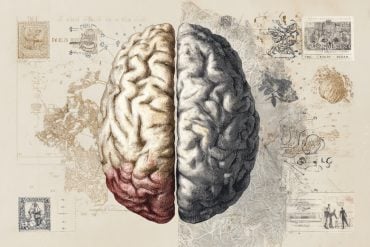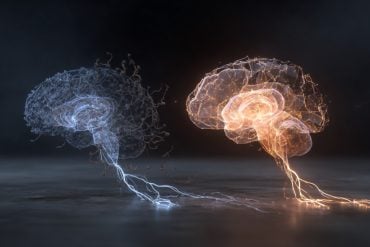Summary: Researchers report fasting affects the circadian rhythm of the liver and skeletal muscles, allowing them to rewire their metabolism. The study suggests fasting can help improve health and protect against aging related diseases.
Source: UC Irvine.
In a University of California, Irvine-led study, researchers found evidence that fasting affects circadian clocks in the liver and skeletal muscle, causing them to rewire their metabolism, which can ultimately lead to improved health and protection against aging-associated diseases. The study was published recently in Cell Reports.
The circadian clock operates within the body and its organs as intrinsic time-keeping machinery to preserve homeostasis in response to the changing environment. And, while food is known to influence clocks in peripheral tissues, it was unclear, until now, how the lack of food influences clock function and ultimately affects the body.
“We discovered fasting influences the circadian clock and fasting-driven cellular responses, which together work to achieve fasting-specific temporal gene regulation,” said lead author Paolo Sassone-Corsi, Donald Bren Professor of Biological Chemistry at UCI’s School of Medicine. “Skeletal muscle, for example, appears to be twice as responsive to fasting as the liver.”
The research was conducted using mice, which were subjected to 24-hour periods of fasting. While fasting, researchers noted the mice exhibited a reduction in oxygen consumption (VO2), respiratory exchange ratio (RER), and energy expenditure, all of which were completely abolished by refeeding, which parallels results observed in humans.

“The reorganization of gene regulation by fasting could prime the genome to a more permissive state to anticipate upcoming food intake and thereby drive a new rhythmic cycle of gene expression. In other words, fasting is able to essentially reprogram a variety of cellular responses. Therefore, optimal fasting in a timed manner would be strategic to positively affect cellular functions and ultimately benefiting health and protecting against aging-associated diseases.”
This study opens new avenues of investigation that could ultimately lead to the development of nutritional strategies to improve health in humans.
Sassone-Corsi first showed the circadian rhythm-metabolism link some 10 years ago, identifying the metabolic pathways through which circadian proteins sense energy levels in cells.
Also contributing to the work were Kenichiro Kinouchi, Marlene Cervantes and Selma Masri from UCI’s Department of Biological Chemistry, Center for Epigenetics and Metabolism; Christophe Magnan, Nicholas J. Ceglia, Yu Liu from UCI’s Department of Computer Science, Institute for Genomics and Bioinformatics; Nunzia Pastore, Tuong Huynh and Andrea Ballabio from Baylor College of Medicine in Houston, Texas; and, Pierre Baldi of UCI’s Institute for Genomics and Bioinformatics.
Funding: Kenichiro Kinouchi was supported by a Japan Society for the Promotion of Science(JSPS) fellowship. Christophe Magnan, Nicholas Ceglia, Yu Liu and Pierre Baldi were supported by grants from the Defense Advanced Research Projects Agency (DARPA; D17AP00002) and NIH (GM123558) to Pierre Baldi. This study was supported by the NIH, a Novo Nordisk Foundation Challenge Grant, and INSERM (France).
Source: Anne Warde – UC Irvine
Publisher: Organized by NeuroscienceNews.com.
Image Source: NeuroscienceNews.com image is credited to Sassone-Corsi et al./Cell Reports.
Original Research: Open access research for “Fasting Imparts a Switch to Alternative Daily Pathways in Liver and Muscle” by Kenichiro Kinouchi, Christophe Magnan, Nicholas Ceglia, Yu Liu, Marlene Cervantes, Nunzia Pastore, Tuong Huynh, Andrea Ballabio, Pierre Baldi, Selma Masri, and Paolo Sassone-Corsi in Cell Reports. Published December 18 2018.
doi:10.1016/j.celrep.2018.11.077
[cbtabs][cbtab title=”MLA”]UC Irvine”How Fasting Can Improve Overall Health.” NeuroscienceNews. NeuroscienceNews, 15 January 2019.
<https://neurosciencenews.com/fasting-health-10546/>.[/cbtab][cbtab title=”APA”]UC Irvine(2019, January 15). How Fasting Can Improve Overall Health. NeuroscienceNews. Retrieved January 15, 2019 from https://neurosciencenews.com/fasting-health-10546/[/cbtab][cbtab title=”Chicago”]UC Irvine”How Fasting Can Improve Overall Health.” https://neurosciencenews.com/fasting-health-10546/ (accessed January 15, 2019).[/cbtab][/cbtabs]
Abstract
Fasting Imparts a Switch to Alternative Daily Pathways in Liver and Muscle
The circadian clock operates as intrinsic time-keeping machinery to preserve homeostasis in response to the changing environment. While food is a known zeitgeber for clocks in peripheral tissues, it remains unclear how lack of food influences clock function. We demonstrate that the transcriptional response to fasting operates through molecular mechanisms that are distinct from time-restricted feeding regimens. First, fasting affects core clock genes and proteins, resulting in blunted rhythmicity of BMAL1 and REV-ERBα both in liver and skeletal muscle. Second, fasting induces a switch in temporal gene expression through dedicated fasting-sensitive transcription factors such as GR, CREB, FOXO, TFEB, and PPARs. Third, the rhythmic genomic response to fasting is sustainable by prolonged fasting and reversible by refeeding. Thus, fasting imposes specialized dynamics of transcriptional coordination between the clock and nutrient-sensitive pathways, thereby achieving a switch to fasting-specific temporal gene regulation.







